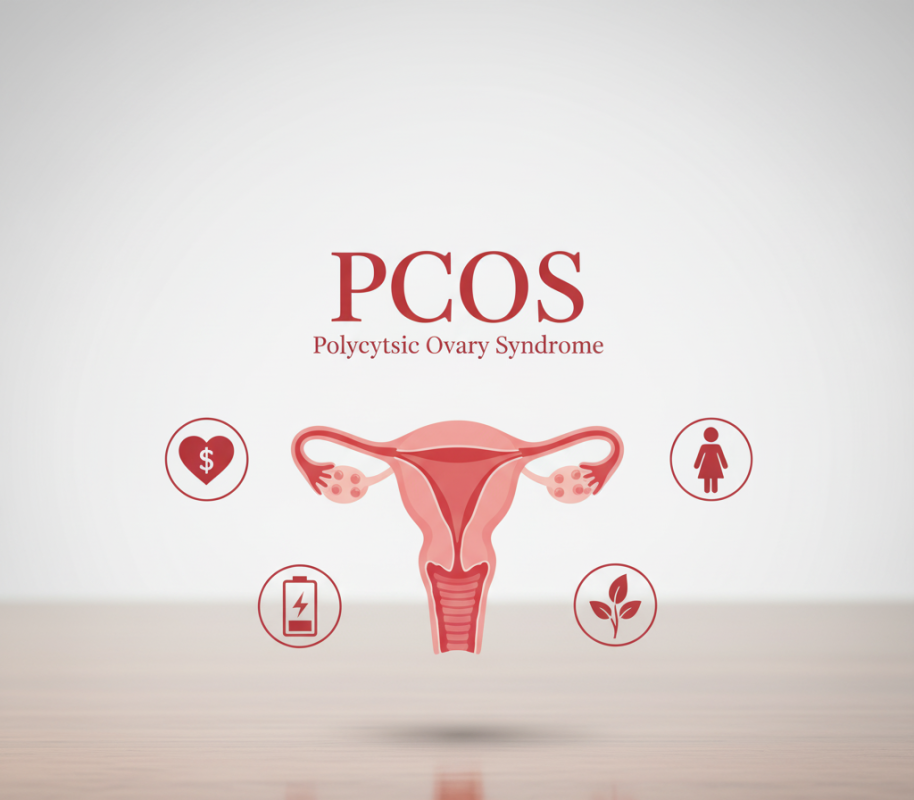No products in the cart.
HEALTH BLOGS BY FITBYNET
What is PCOS? Symptoms, Causes, and Treatment Options
Polycystic Ovary Syndrome (PCOS) is a common endocrine disorder that affects millions of women worldwide. It is characterized by hormonal imbalances that disrupt ovulation and lead to a variety of symptoms, including irregular periods, weight gain, acne, and excessive hair growth. If left untreated, PCOS can increase the risk of infertility, metabolic disorders, and other long-term health issues.
Who is Affected by PCOS?
PCOS is one of the most prevalent hormonal disorders, impacting 10-15% of women of reproductive age globally. While it can develop at any age after puberty, most women are diagnosed in their late teens or early 20s, often after experiencing menstrual irregularities or difficulty conceiving.
Common Symptoms of PCOS
Symptoms of PCOS vary, but the most common include:
- Irregular periods: Women with PCOS often experience missed, infrequent, or weighty periods.
- Hirsutism: Unwanted hair growth on the face, chest, and back due to high androgen levels.
- Acne and oily skin: Increased androgen production leads to persistent breakouts and excessive skin oiliness.
- Weight gain and difficulty losing weight: Many women with PCOS struggle with obesity or weight fluctuations.
- Hair thinning or male-pattern baldness: Hair loss occurs due to hormonal imbalances.
- Dark patches of skin (Acanthosis Nigricans): This condition causes hyperpigmentation, especially around the neck, armpits, and groin.
- Ovarian cysts: Small fluid-filled sacs in the ovaries can be detected via ultrasound, though not all women with PCOS develop cysts.
- Infertility: PCOS is one of the leading causes of female infertility due to irregular ovulation.
Causes of PCOS
Although the exact cause of PCOS remains unknown, several factors contribute to its development:
1. Hormonal Imbalances
PCOS is associated with an overproduction of androgens, or male hormones, which disrupt ovulation and contribute to symptoms like acne and excess hair growth.
2. Insulin Resistance
Insulin resistance is present in 70-80% of women with PCOS, causing high insulin levels that trigger androgen production. This leads to weight gain and increases the risk of type 2 diabetes.
3. Genetic Predisposition
PCOS tends to run in families, indicating a genetic link. Women with a mother or sister diagnosed with PCOS have a higher likelihood of developing the condition.
4. Chronic Inflammation
Low-grade inflammation is commonly found in women with PCOS and may contribute to insulin resistance and hormonal imbalance.
Diagnosis of PCOS
Doctors diagnose PCOS using the following criteria, requiring at least two of these three:
- Irregular or absent menstrual cycles
- Elevated androgen levels (based on symptoms or blood tests)
- Polycystic ovaries detected via ultrasound
Additional tests may include:
- Blood tests to assess hormone levels, glucose, and insulin resistance.
- A pelvic ultrasound to examine the ovaries and uterine lining.
PCOS and Fertility: Can You Get Pregnant?
Yes, women with PCOS can conceive with appropriate treatment. Lifestyle modifications, fertility medications, and assisted reproductive technologies (such as IVF) can enhance fertility outcomes.
Best Ways to Manage PCOS
While PCOS has no cure, its symptoms can be effectively managed with lifestyle changes, medications, and natural remedies.
1. Lifestyle Modifications
- Balanced Diet: A diet rich in fiber, lean proteins, and healthy fats can help regulate insulin levels.
- Regular Exercise: Engaging in at least 30-45 minutes of daily physical activity can improve insulin sensitivity and aid in weight management.
- Weight Loss: Losing 5-10% of body weight can significantly reduce symptoms and improve fertility.
2. Medications for PCOS
- Birth Control Pills: Regulate menstrual cycles and reduce acne and excess hair growth.
- Metformin: Aids in insulin sensitivity and restores ovulation.
- Anti-Androgen Medications: Help reduce excessive hair growth and acne.
- Ovulation-Stimulating Drugs: Clomiphene and Letrozole are used for those trying to conceive.
3. Natural Remedies and Alternative Therapies
- Herbal Supplements: Spearmint tea, cinnamon, and inositol have shown promise in managing hormonal balance.
- Yoga & Meditation: Stress management through yoga and meditation can help lower cortisol levels, which impact insulin resistance.
- Acupuncture: Some women find relief from PCOS symptoms through acupuncture treatments.
Long-Term Health Risks of PCOS
Without proper management, PCOS increases the risk of:
- Type 2 diabetes
- High blood pressure and heart disease
- Endometrial cancer
- Sleep apnea and other sleep disorders
- Depression and anxiety
Regular medical check-ups and proactive health management can prevent these complications.
Can PCOS Be Prevented?
While PCOS cannot be entirely prevented, adopting a healthy lifestyle can significantly reduce its severity. Maintaining a nutritious diet, engaging in regular physical activity, and managing stress levels help regulate hormones and minimize PCOS-related health risks.
Also Read:- What is PCOD? Causes, Symptoms, and Diagnosis
Frequently Asked Questions
1. Can PCOS Go Away On Its Own?
No, PCOS is a lifelong condition, but symptoms can be controlled with lifestyle changes and medical treatment.
2. Can You Have PCOS Without Symptoms?
Yes, some women experience mild or no noticeable symptoms and only discover PCOS during fertility assessments.
3. Is PCOS Genetic?
Yes, genetic factors play a role in PCOS development.
4. What’s the Difference Between PCOS and Endometriosis?
PCOS is a hormonal disorder, whereas endometriosis involves the abnormal growth of uterine tissue outside the uterus, leading to pain and heavy periods.
Final Thoughts
PCOS is a manageable condition with the right treatment and lifestyle choices. If you experience symptoms like irregular periods, acne, or difficulty conceiving, seek medical advice for early diagnosis and treatment. A healthy diet, regular exercise, and proper medical care can help you manage PCOS effectively and improve your overall well-being.

